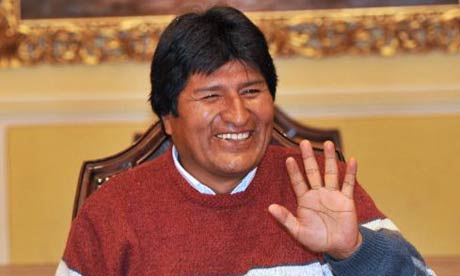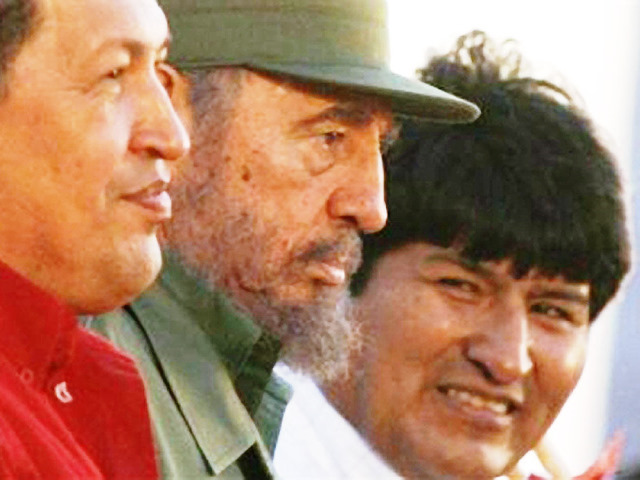Bolivia
Debemos aprender las lecciones del siglo XX para aplicarlas al comienzo del siglo XXI
Eric Toussaint
[Click HERE for the English translation]
By Eric Toussaint, translated by Federico Fuentes for Links International Journal of Socialist Renewal
Evo Morales: Ten commandments to save the planet

By Evo Morales Ayma, president of the Republic of Bolivia
Message to the Continental Gathering of Solidarity with Bolivia in Guatemala CityOctober 9, 2008 -- Sisters and brothers, on behalf of the Bolivian people, I greet the social movements of this continent present in this act of continental solidarity with Bolivia.
We have just suffered the violence of the oligarchy, whose most brutal expression was the massacre in Panda, a deed that teaches us that an attempt at power based on money and weapons in order to oppress the people is not sustainable. It is easily knocked down, if it is not based on a program and the consciousness of the people.
We see that the re-founding of Bolivia affects the underhanded interests of a few families of large landholders, who reject as an aggression the measures enacted to favour the people such as a more balanced distribution of the resources of natural gas for our grandfathers and grandmothers, as well as the distribution of lands, the campaigns for health and literacy, and others.
Refounding Bolivia: Morales calls for vote on a new democratic constitution

at the sacred place of Tiwanaku.
Photo: AFP
By Raul Burbano
October 13, 2008 -- Bolivian President Evo Morales has called for a national referendum on the country’s new draft constitution on December 7. The demand of the Bolivian people for a new and socially, politically and economically inclusive constitution is at the heart of the present political upheaval in that country.
Right-wing forces representing the country’s traditional ruling oligarchy have launched a secessionist movement to balkanise the country, in an attempt to block the constitutional referendum. They have organised murderous fascist gangs to terrorise the population.
They are backed by the US government, whose ambassador, Philip Goldberg, has recently been expelled from Bolivia for his support of the opposition and openly admitted interference in Bolivian political life.
On the other side the vast majority of the Bolivians, more than 67% of whom just voted support President Evo Morales in a recall referendum.
Racism, domination and revolution in Bolivia
By Adolfo Gilly
Oppose the fascist coup in Bolivia! (Sign the petition)
Dear comrades and friends,
You will be aware of the US-backed "civic coup" underway in the Bolivia, and the threats this poses to democracy and all nations' right to political, economic and social sovereignty.
Federico Fuentes on latest developments in Bolivia
August 27, 2008 – Federico Fuentes, Links International Journal of Socialist Renewal's and Green Left
Bolivia: Two years of `post-neoliberal’ Indigenous nationalism -- a balance sheet
By the Bolpress editorial board, translated by Sean Seymour Jones for Links International Journal of Socialist Renewal
State intervention in economic activity -- the nationalisation of businesses, restrictions on exports and price controls, among other measures -- doesn’t appear to be contributing to the materialisation of the structural changes postulated by the National Development Plan (PND) of the Movement Towards Socialism (MAS). This is the evaluation of business leaders, analysts and political leaders from the right-wing opposition in Bolivia. However, according to the government of President Evo Morales, the brutal and desperate reaction of the dominant classes "in relegation" proves that something is changing.

Bolivia’s struggle for justice, against right-wing offensive
By Hugo Moldiz, translated and introduced by Federico Fuentes
August 10, 2008 -- “Given everything that is occurring in Tarija, Santa Cruz, Pando and Beni, we have to denounce … that we are on the threshold of a real coup d’etat against the constitutional order”, announced Bolivian minister of the presidency, Ramon Quintana, on August 7.
The day before, two bullets were fired into his car in an assassination attempt during a visit to the city of Trinidad, in Beni. Beni is part of the “half moon” of the resource-rich eastern departments including Santa Cruz, Tarija and Pando, that are a stronghold of the opposition to the left-wing government of indigenous President Evo Morales.
“What the prefects are doing today is nothing more than an act of sedition, of contempt, or organisation of illegal forces, paramilitaries, to go against all public liberties”, added Quintana.
Bolivia: The COB and Morales -- `Over the shoulders of Kornilov'
By Jorge Sanmartino
On July 21, 2008, some 15 days before the recall referendum, the Bolivian Workers Central (COB) initiated an indefinite general strike with roadblocks and permanent protests until its pension law project is approved by Congress. It was the most important protest that the COB has organised in years. Jamie Solares, the most radical of all the COB spokespeople, even maintained that if the law was not approved the COB would call for a “protest vote”. The current executive secretary of the Departmental Workers Central of Oruro (COD) was the executive secretary of the COB until 2006.
With a combative tone, Solares tends to invoke Lenin to justify some of his own actions. Could we therefore invoke the advice of the old Bolshevik leader in order to explain what the COB is doing today? Because its indefinite general strike, blockading the main highways in the country, blowing up bridges with dynamite and direct confrontation has cost the lives of two miners in Huanuni and more than 30 injured.
Latin America's struggle for integration and independence
Caracas, July 26, 2008 -- Commenting on how much the two had in common — same age, three children, similar music tastes — Ecuadorian President Rafael Correa said to Mexican President Felipe Calderon on April 11 that “perhaps we represent the new generation of leaders in Latin America”. He added, however, that one difference still remained: Calderon had still not become a socialist. “Being right wing is out of fashion in Latin America … Join us, you are always welcome.”
The election of Fernando Lugo as Paraguayan president seems to confirm the idea of a new fashion for presidents. The former priest joins the ranks of current Latin American presidents that includes two women (Cristina Fernandez de Kirchner in Argentina and Michelle Bachelet in Chile), an indigenous person (Evo Morales in Bolivia), a former militant trade unionist (Lula da Silva in Brazil), a radically minded economist (Rafael Correa in Ecuador), a doctor (Tabare Vasquez in Uruguay), a former guerrilla fighter (Daniel Ortega in Nicaragua) and a former rebel soldier (Hugo Chavez in Venezuela).
Leo Panitch on movements, debates and struggles in Latin America
July 17, 2008 – A report by Leo Panitch on an international seminar organised by the Brazilian Landless People's Movement (MST).